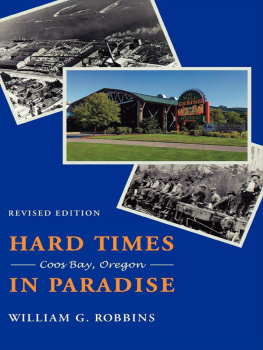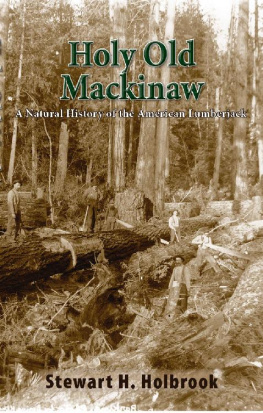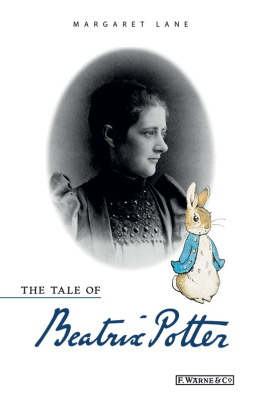COLUMBIA NORTHWEST CLASSICS
Chris Friday, Editor
COLUMBIA NORTHWEST CLASSICS
Columbia Northwest Classics are reprints of important studies about the peoples and places that make up the Pacific Northwest. The series focuses especially on that vast area drained by the Columbia River and its tributaries. Like the plants, animals, and people that have crossed over the watersheds to the east, west, south, and north, Columbia Classics embrace a Pacific Northwest that includes not only Oregon, Washington, and Idaho but also British Columbia, the Yukon, Alaska, and portions of Montana, California, Nevada, and Utah.
Mountain Fever: Historic Conquests of Rainier
by Aubrey Haines
To Fish in Common: The Ethnohistory
of Lummi Indian Salmon Fishing
by Daniel L. Boxberger
Mexican Labor and World War II:
Braceros in the Pacific Northwest, 1942-1947
by Erasmo Gamboa
Boys of Boise: Furor, Vice,
and Folly in an American City
by John Gerassi
Gyppo Logger
by Margaret Elley Felt
GYPPO
LOGGER
MARGARET ELLEY FELT
With a Foreword by Robert E. Walls

Copyright 1985 by Margaret Elley Felt
Originally published in 1963 by Caxton Printers
First paperback edition published in 1985 by Maverick Publications
University of Washington Press paperback edition published in 2002
Foreword by Robert E. Walls and Afterword by Chris Friday
Copyright 2002 by the University of Washington Press
Printed in the United States of America
Library of Congress Cataloging-in-Publication Data
Felt, Margaret Elley.
Gyppo logger / Margaret Elley Felt ;
with a foreword by Robert E. Walls.
p. cm.(Columbia Northwest classics)
Originally published: Caldwell, Idaho : Caxton Printers, 1963.
ISBN: 978-0-295-98166-6
1. Felt, Margaret Elley.
2. Loggers spousesWashington (State)Biography.
3. LoggersWashington (State)Anecdotes.
4. LoggingWashington (State)Anecdotes.
I. Title. II. Series.
SD537.52.F46A3 2001 634.9809797dc21 2001035598
All rights reserved. No part of this publication may be reproduced or transmitted in any form or by any means, electronic or mechanical, including photocopying, recording, or any information storage or retrieval system, without permission in writing from the publisher.
The paper used in this publication is acid-free and recycled from 10 percent post-consumer and at least 50 percent pre-consumer waste. It meets the minimum requirements of American National Standard for Information SciencesPermanence of Paper for Printed Library Materials, ANSI Z39.48-1984. 
Photographs by Gus Pasquarella.
This book is respectfully dedicated
to the three men in my life, in memoriam.
WALTER ORIE ELLEY (18901963),
my father, who taught me to appreciate and
enjoy the great out-of-doors as he loved
the Idaho mountains during his lifetime.
HORACE WOODRUFF FELT (19131997),
my favorite gyppo and my husband for fifty-seven years,
who conned me into the gyppo logging game.
EDSON M. CASE,
our late attorney and good friend,
who got me out of this gyppo logging business
more or less intactwith only a few gray hairs
and a slight nervous condition to show for my
fifteen years as the working wife of a gyppo logger.
CONTENTS
FOREWORD
THE UNIVERSE IS MADE OF STORIES, NOT ATOMS, the poet Muriel Rukeyser once declared. The timber industry is a splendid example of this observation: an industry of markets and machines, trees and timber towns, but ultimately an industry constituted in the public sphere as a grand, heroic narrative with tales of working-class struggles, natures subjugation, and even corporate foresight. Margaret Elley Felts Gyppo Logger, originally published in 1963, did not attempt to contradict this overly romanticized epic. It did, however, present a story almost universally overlooked in the industrys history: the emergence of family-based, independent contract loggers in the post-World War II timber economy, and the crucial role of women within that economy.redesign of Northwest forests from old-growth stands to the tree farms of industrial forestry.
In telling this story, Margaret Elley Felt drew upon the inherent power of autobiographical narrative, a literary form that is compelling and accessible to a broad audience, and one that is also essential to our comprehensive understanding of the past. As subjective and personal sources, autobiographies and memoirs that originate from women and the working class have tremendous historical value both in the way they reveal the dynamic relationship between private and public life, and in the way they illuminate historical changes from the perspective of people who lived through them. However, the value of Gyppo Logger is further enhanced by its autoethnographic qualities: a first-person narrative that places the self within a specific social context, in this case one womans unique description of the social and economic life of a male-dominated occupational subculture with which she is intimately familiar and willing to analyze according to its gendered contours. By creatively shaping this mode of self-representation, Felt introduced an authoritative womans voice into a world of lumbering that previously had been limited to the stories of men. In so doing, she moved women from the margins of the industrys recent history to its center, and produced a story that helped to demythologize the Bunyanesque West and the prevailing ideology of gender that constructed it.
During the past few decades, logging has been an industry riddled with controversy, particularly in the Pacific Northwest. The industry has used science and managed order to improve the process of growing trees for the commodity production of timber. However, historians have documented how the U.S. Forest Service mismanaged a resource in its trust, exceeding sustainable yields
Gyppo Logger provides an excellent place to begin addressing these vital questions. Felts discussion of the gendered relationship among work, economy, class, and occupational culture evokes striking historical parallels to womens central role in the family economies of other industrial and agrarian settings.success of family, community, and regional economies. Moreover, the authors commentary on her own attitudes toward the forest around her as a productive and regenerative landscape is highly suggestive of the breadth of class-based meanings that nature holds for American women, a diversity that certainly complicates many ecofeminist arguments about womens connections to the natural world.
The books principal focus is on one Washington State familys role in the emergent gyppo economy that followed the 1930s, when logging fever ran epidemic. Brother joined brother and sons joined fathers to establish their own small companies of two to twenty employees who cut, logged, and hauled timber on a contract basis for larger companies, mills, and a variety of other timber owners. Such entrepreneurial aspirations to financial independence were clearly in the interests of large timber corporations, who saw an opportunity to mitigate the strength of an increasingly unionized and contentious work force that was based on traditional wage labor. Furthermore, they reduced their own expenses by contracting independent loggers with an interest in upward mobility, who were resistant to unionization and willing to bear the costs and risks of timber production. Changes in logging technology were in the gyppos favor, with the wide availability of more mobile and affordable machinery such as trucks and tractors, and the development of a dense network of roads which provided access to formerly untouched stands of timber, especially on federal and state lands. Log markets also expanded, driven by postwar demographic shifts in the Far West and a booming home construction industry which increased demand for trees from thinning and salvage operations and for second-growth timber and formerly unmarketable species
Next page










